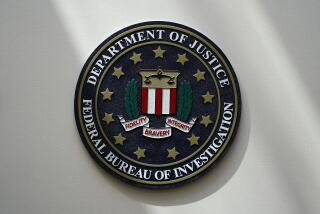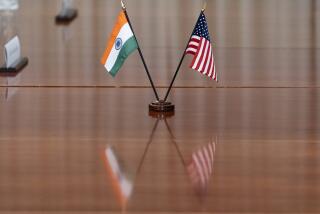Terror Suspect Caught in Sudan, 5 in France
- Share via
WASHINGTON — The hunt for global terrorists intensified Wednesday with the capture of a suspected Al Qaeda operative in Sudan and the arrest of five other men in France in connection with failed terrorist plots, even as authorities around the world searched for accomplices in a separate scheme to launch a “dirty” bomb attack on American soil.
U.S. authorities suspect that the man apprehended in Sudan is the leader of an Al Qaeda cell and recently fired a surface-to-air missile at a U.S. aircraft at the Prince Sultan air base in Saudi Arabia, according to a U.S. government official who asked not to be identified.
Authorities described the capture of the unidentified Sudanese man as significant because of his suspected role as a terrorist cell leader and because he appears to be cooperating with authorities.
“Was this guy a Zubeida? No,” the official said, referring to the Osama bin Laden lieutenant Abu Zubeida, who was captured in March. “But this is someone important. Obviously, anybody who’s looking to fire down a U.S. aircraft, we want off the streets.”
Last month, U.S. and Saudi officials were alarmed to discover on the air base the remnants of a fired missile that investigators concluded likely was from Al Qaeda, according to a classified U.S. report obtained by The Times. The discovery prompted the FBI to warn U.S. law enforcement to look out for attacks against U.S. aircraft using the 3 1/2-foot-long, shoulder-fired missiles.
It was unclear Wednesday what led authorities to the Sudanese suspect, and authorities would not say where he is being held. He is no longer believed to be in Sudanese custody, but he has not been turned over to U.S. authorities, officials said. But he does appear to be cooperating with investigators by revealing details about his firing the missile.
Meanwhile, in France, two Pakistanis and three men from North Africa were roused from their homes outside Paris about 6 a.m. Wednesday and arrested because police suspect they have ties to Richard C. Reid, the 28-year-old suspected “shoe bomber” accused of trying to blow up a Paris-to-Miami flight in December. The men, who can be held for four days without being charged under France’s expanded anti-terrorism laws, may have provided Reid with logistical support in France before he tried to fly to Miami, authorities said.
“This is the result of a months-long investigation. The five people are suspected to be connected with Richard Reid,” said Remi Marechaux, a spokesman for the French Embassy in Washington.
Marechaux said that, while it is “too soon to tell” how deeply involved in the bombing plot the five men may have been, U.S. authorities may be allowed to question the detainees. “This was a French operation ... but I don’t see any reason why there wouldn’t be a continuation of the cooperation” between France and the U.S. in the global hunt for terrorists in the wake of the Sept. 11 terrorist attacks, he said in an interview.
In the nearly six months since Reid’s arrest, investigators have become convinced that accomplices in France gave him shelter and logistical support and prepared the complex explosive devices rigged in his shoes.
Detective work quickly pinpointed a cyber cafe in an immigrant neighborhood in north Paris where Reid was seen with companions. He sent numerous e-mails from the cafe in the days before he boarded the American Airlines flight that was his target, according to officials.
The probe overseen by top anti-terrorist magistrate Jean Louis Bruguiere has advanced more slowly since then. In April, investigators arrested seven Pakistanis suspected of acting as accomplices, but later released six of them and returned the seventh to Pakistan because he was an illegal immigrant. Several of the suspects freed after the April roundup reportedly led French authorities to the men apprehended Wednesday.
Authorities see some key similarities between Reid and Jose Padilla, the former Chicago street gang member accused this week of plotting to detonate a dirty bomb in the United States.
Neither man fits the traditional profile of the Middle Eastern terrorist--Reid is a British drifter, while Padilla is a U.S. citizen of Puerto Rican descent.
Both men allegedly had ties to Bin Laden’s Al Qaeda network. Reid allegedly was an Al Qaeda operative who fell under the direction of Islamic terrorists in Pakistan, while Padilla allegedly met and traveled with key Bin Laden aide Zubeida in Pakistan and received explosives training from other Al Qaeda-linked terrorists.
And both men are believed to have flown to America alone from Europe to wreak havoc on the U.S.
Authorities suspect that Padilla, who converted to Islam in the 1990s and moved from Florida to the Middle East in 1998, flew into Chicago last month on a “reconnaissance mission” to scout out possible targets for detonating a radioactive dirty bomb. The weapon, which authorities have feared Al Qaeda might employ, uses a conventional explosive encased in radioactive waste to spew contaminated debris over large areas.
Although Padilla was believed to be in the early planning stages of the plot, some U.S. authorities suspect that he planned to check out university labs in the U.S. and other potential sources of radioactive material, then report back to Al Qaeda leaders in Pakistan.
An associate of Padilla’s, identified as Benjamin Ahmed Mohammed, is in custody in Pakistan on suspicion of aiding in the plot, and Pakistani Interior Ministry sources said there is an urgent search for others there who may have been connected to the plot.
In the United States, however, little evidence has emerged to suggest that Padilla had accomplices here.
“Obviously, we’re concerned about that and following all leads,” a Justice Department official said Wednesday. “But so far” no accomplices have surfaced.
Papers filed by Padilla’s court-appointed lawyer in New York City were made public Wednesday. They ask that he be released from military custody or at least be given access to legal counsel.
Padilla is in legal limbo, held by the military in South Carolina as an “enemy combatant.” The Pentagon says it has no plans to try him in a military tribunal.
“The evidence linking Padilla to the alleged ‘dirty bomb’ plot is weak at best,” Donna R. Newman, the defendant’s lawyer, said in the document. “There is insufficient evidence for the government to obtain an indictment against Padilla.... Padilla’s constitutional rights have been violated.”
U.S. District Judge Michael B. Mukasey made no immediate ruling but directed that a copy of the motion be served on the Pentagon and gave the government until June 21 to respond.
Atty. Gen. John Ashcroft, in Switzerland to meet with top Swiss authorities about the war on terrorism, said Padilla’s arrest points up the ongoing threat posed by Bin Laden’s network.
“We do not believe that Al Qaeda maintained camps where thousands or perhaps tens of thousands were trained simply so they could send 20 individuals into activity for one day--albeit a very tragic day,” Ashcroft said, referring to the Sept. 11 attacks on the World Trade Center and the Pentagon.
Swiss authorities said they are working closely with U.S. officials in the unfolding Padilla investigation and other terrorism-related activities. Swiss counter-terrorism officials, for instance, were watching Padilla closely, along with U.S. agents, during his trips to Zurich from Pakistan, according to Mark Wiedmer, a spokesman for the Swiss attorney general’s office.
Padilla made “possibly several” trips to Zurich and perhaps other locations in Switzerland before his arrest May 8 at Chicago’s O’Hare International Airport, where he had $10,500 in cash on him, and he may have met with others who helped him with logistics or financing, Wiedmer said.
“He made several trips to Zurich; we are looking at whether he brought money with him, if he got money here, if there were other people involved,” Wiedmer said. “You can be sure we are looking into all of this and any possible relevant detail.”
Lichtblau and Meyer reported from Washington and Rotella from Paris. Times staff writers Tyler Marshall, John J. Goldman and John-Thor Dahlburg contributed to this report.
More to Read
Sign up for Essential California
The most important California stories and recommendations in your inbox every morning.
You may occasionally receive promotional content from the Los Angeles Times.













